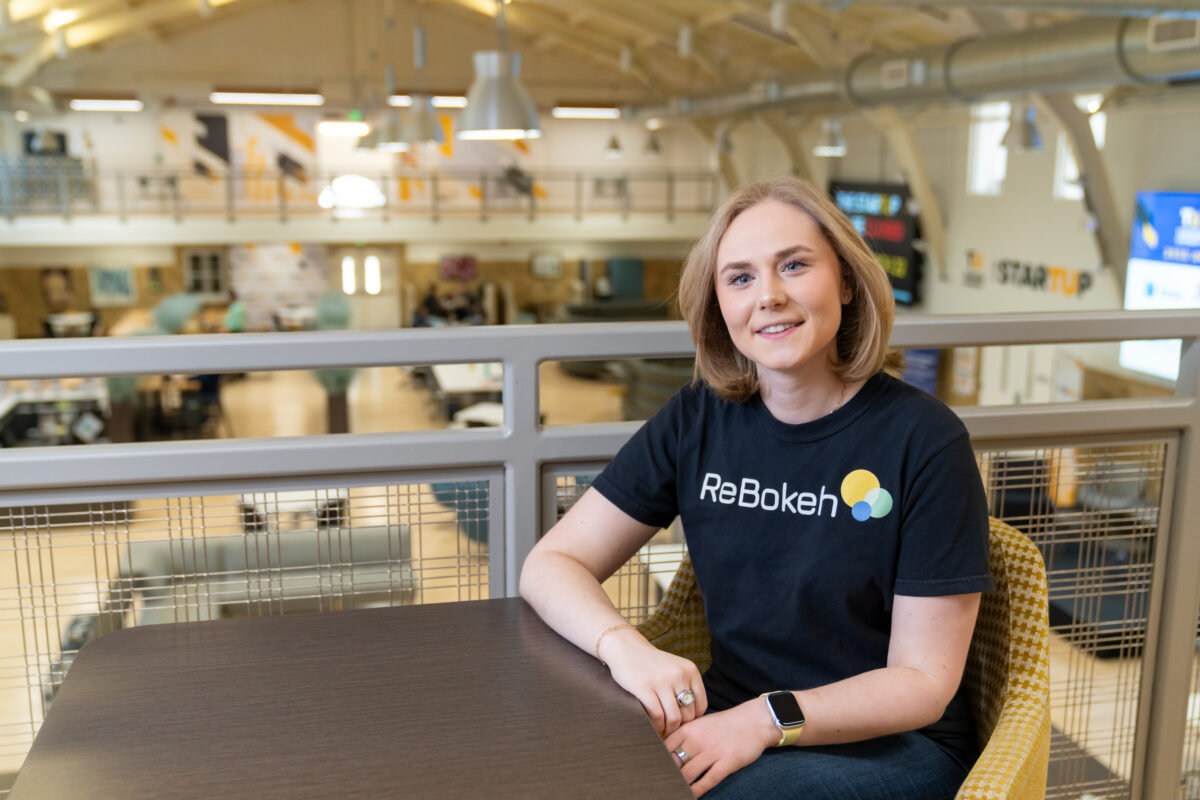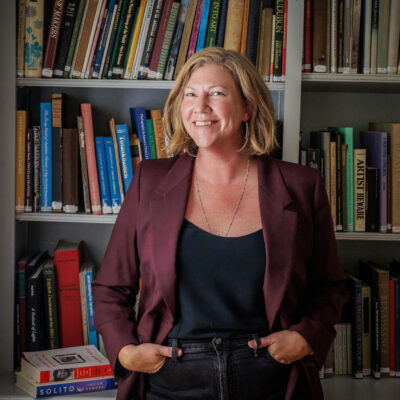
In true tech-legend style, Rebecca Rosenberg founded her company ReBokeh Vision Technologies out of her undergrad dorm room at Bucknell University when she was just 21 years old. Born with low vision, the New Jersey native had an idea for a user-friendly assistive technology that people could access through their cell phones.
“It’s like a photo-editing app, for real life,” explains Rosenberg, with users able to apply features like zoom, gray-scale inversions, and color filters, depending on their vision needs, to enhance a live image directly through their smartphone camera.
Rosenberg moved to Baltimore following graduation in 2020 and developed the ReBokeh app as a side project while enrolled in a master’s program at the Johns Hopkins Center for Bioengineering Innovation and Design and, later, as part of Towson University’s StarTUp Accelerator program.
Today, ReBokeh partners with a growing list of organizations across the country, including the Smithsonian’s Renwick Gallery, to provide ReBokeh’s app-enabled technology to users in highly visual spaces, such as museums, zoos, and performing arts venues.
In the celebratory wake of making this year’s Forbes’s 30 Under 30 list of standout entrepreneurs in the category of social impact, the Hampden resident spoke with us about her up-and-coming company, Baltimore’s energetic tech scene, and her mission to educate the world about the low-vision community.
How did your own experience with low vision inspire the idea for ReBokeh?
I’ve had low vision my whole life, so I don’t know the world any differently. Growing up, I really struggled with the available accessibility options. There were audiobooks, but I was a math and science girl, and it’s really hard to do math or understand science diagrams from an audiobook.
The only other option was these large glass magnifiers that were totally impractical. When I asked my teacher to teach me Braille, she told me my vision wasn’t bad enough to justify the resources. So I just felt like there was a real mismatch in what I was trying to do, which was to make the most of the vision that I have, versus the available tools.
So ReBokeh is designed for people like you, who may be low vision, or even legally blind, but retain some vision?
When we think about people with vision impairments, we often think about it as a binary. You either have normal vision, or you’re blind and have no sight at all. But 90 percent of people with any type of vision impairment retain some amount of functional sight, and that includes people who are legally blind.
So there’s this enormous population of people, including people who are experiencing vision changes as a result of age, who retain a lot of sight capabilities, and the only options that they are being offered from an accessibility perspective are audio or tactile. Those are good, and they absolutely serve a certain population. But people want to use their vision. It’s an enormous gap that we are trying to fill.
What kind of support is there for young tech entrepreneurs in Baltimore?
I truly do not believe that we would be where we are if it had not been for everything that Baltimore has to offer. There are great educational opportunities here, proximity to Philly and D.C. and New York—and [tech hub] UpSurge, which helped build the startup entrepreneurship scene in Baltimore. In addition to the funding and educational opportunities, the institutions around tech in the city are creating social spaces for the people in the community, like UpSurge’s weekly happy hour. That’s where we all get together, because we don’t have to plan it!
It sounds like the city is a hidden gem in the larger tech scene.
Absolutely it is. There’s a really good spectrum of people, and everybody wants to support everybody. It’s not just companies that are on their Series D [final funding round], or pre-seed companies [in the startup stage]—it’s everybody along the journey. You can find somebody to talk to about anything that you’re dealing with, which is really cool. There isn’t cutthroat competition. People are wonderful here and have been a large part of the reason why I’ve stayed in Baltimore.
As you grow, what does success look like for your company?
I think we have already been quite successful by making a tangible impact on the low-vision community. We have users in 115 countries around the world, and I get messages from people about what a difference ReBokeh has made to them. On the financial end, we have figured out how to directly tie our financial success with that impact, because we’re able to shift the cost burden away from individuals to organizations.
On a personal level, success is also bringing awareness to the low-vision community, because it’s so often something people misunderstand. I think people absolutely care, they really want to provide accessible options for people with vision impairments, but they’ve never had it explained to them that 90 percent of people with vision impairments have functional sight and want to use it. So I think there’s also this education aspect we do that will ultimately help create a world that is more visually accessible.
